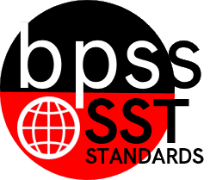8th Grade Standards
| All categories |
(PRIORITIZED STANDARDS) |
|---|
SST-08.E 6-8 Social StudiesEconomics DomainStandards
DescriptionAt the middle school level, basic economic principles are best integrated within United States history, world history, and geography. The knowledge of names and definitions is essential for acquiring knowledge; however, high-quality teaching and learning demands more than merely mastering facts and terms. Therefore, in teaching these standards, it is encouraged to use an active economic inquiry approach. Activities and assessments that require students to think, analyze, synthesize, evaluate, compare, contrast, and argue using economic habits of mind should be emphasized.. Calculation Method for DomainsDomains are larger groups of related Standards with benchmarks. So the Domain is a calculation of all the related standards that calculate to the benchmarks. So click on the benchmark identifier below each Standards to access the learning targets and proficiency scales for each standard. | |
SST-08.G 6-8 Social StudiesGeography DomainStandards
DescriptionThese geography standards are based on the Five Themes of Geography: Place, Movement, Regions, Location, and Human-Environment Interaction. These standards are written to give students a global perspective, which they can apply to other courses of study. Quality geography education is more than memorizing places on a map. It involves an understanding of various cultures, their motivations, and their connections to the global community. It also includes a deep understanding of how human beings have altered the landscape of the Earth over time, both physically and culturally. Calculation Method for DomainsDomains are larger groups of related Standards with benchmarks. So the Domain is a calculation of all the related standards that calculate to the benchmarks. So click on the benchmark identifier below each Standards to access the learning targets and proficiency scales for each standard. | |
CIVICS |
|---|
SST-08.C 6-8 Social StudiesCivics Domain Standards
DescriptionThese standards band grades 6-12 in civics & government. It should be noted that some topics will overlap while others will exclusively appear in either middle or high school. Throughout the grade band, a basic knowledge of the foundation, role, and impact of government is emphasized. Students will begin examining the changes in government over time and the continual balance between individual rights and the common good. The goal is that students will learn the skills necessary to understand the role of government in their daily lives and be able to engage in government at all levels. These standards help students become thoughtful citizens who are informed, engaged, and committed to the ideas and values of a democratic republic. The knowledge of names and definitions is essential in/for acquiring knowledge; however, high-quality teaching and learning demands more than merely mastering facts and terms. Therefore, in teaching these standards, an inquiry approach is encouraged. Activities and assessments that require students to think, analyze, synthesize, evaluate, compare, contrast, and argue using a civic engagement lens should be emphasized. Calculation Method for DomainsDomains are larger groups of related Standards with benchmarks. So the Domain is a calculation of all the related standards that calculate to the benchmarks. So click on the benchmark identifier below each Standards to access the learning targets and proficiency scales for each standard. | |
SST-08.C.01 8th Grade (SST) Social StudiesCivics StandardSST-08.C.01 Explain the historical and philosophical foundations of government.Benchmarks
Guiding PracticeThe guiding topics for each benchmark includes various subject matter that can be used to help students reach the standard. Calculation Method for StandardsStandards are larger groups of related benchmarks. So the Standard is a calculation of all the related benchmarks. So click on the benchmark identifier below each Standards to access the learning targets and proficiency scales for each standard. | |
SST-08.C.01.1
8th Grade (SST) Civics Domain: SST-08.C.01.1 Evaluate the thoughts of major political philosophers.Guiding Topics: Cicero, Socrates, Plato, Aristotle, Iroquois Confederation, Locke, Hobbes, Montesquieu, Rousseau, Marx, Natural Rights Philosophy, Classical Republicanism Student Learning Targets:Knowledge Targets
Reasoning Targets
Skills (Performance) Targets
Product Targets
Proficiency ScaleThe Student can ...1 Beginning... with help, demonstrate a partial understanding of some of the simpler details and processes (Score 2.0 content) and some of the more complex ideas and processes (Score 3.0 content).
2 Developing... demonstrate no major errors or omissions regarding the simpler details and processes but exhibits major errors or omissions regarding the more complex ideas and processes (Score 3.0 content).
3 Proficient“The Standard.”... demonstrate no major errors or omissions regarding any of the information and processes that were end of instruction expectations.
4 Advanced... demonstrate in-depth inferences and applications regarding more complex material that go beyond end of instruction expectations.
ResourcesVocabulary
Websites
| |
SST-08.C.01.2
8th Grade (SST) Civics Domain: SST-08.C.01.2 Explain the influence of British and colonial history on early United States.Guiding Topics: Magna Carta, English Bill of Rights, Petition of Right, Mayflower Compact, formation of colonial governments, deterioration of relations with Great Britain Student Learning Targets:Knowledge Targets
Reasoning Targets
Skills (Performance) Targets
Product Targets
Proficiency ScaleThe Student can ...1 Beginning... with help, demonstrate a partial understanding of some of the simpler details and processes (Score 2.0 content) and some of the more complex ideas and processes (Score 3.0 content).
2 Developing... demonstrate no major errors or omissions regarding the simpler details and processes but exhibits major errors or omissions regarding the more complex ideas and processes (Score 3.0 content).
3 Proficient“The Standard.”... demonstrate no major errors or omissions regarding any of the information and processes that were end of instruction expectations.
4 Advanced... demonstrate in-depth inferences and applications regarding more complex material that go beyond end of instruction expectations.
ResourcesVocabulary
Websites
| |
SST-08.C.01.3
8th Grade (SST) Civics Domain: SST-08.C.01.3 Evaluate the creation and impact of primary sources on political thought in the United States.Guiding Topics: Magna Carta, English Bill of Rights, Petition of Right, Mayflower Compact, Declaration of Independence, Articles of Confederation, Federalist Papers, AntiFederalist Papers, Virginia and New Jersey Plans, the Great Compromise, Constitution, the Bill of Rights Student Learning Targets:Knowledge Targets
Reasoning Targets
Skills (Performance) Targets
Product Targets
Proficiency ScaleThe Student can ...1 Beginning... with help, demonstrate a partial understanding of some of the simpler details and processes (Score 2.0 content) and some of the more complex ideas and processes (Score 3.0 content).
2 Developing... demonstrate no major errors or omissions regarding the simpler details and processes but exhibits major errors or omissions regarding the more complex ideas and processes (Score 3.0 content).
3 Proficient“The Standard.”... demonstrate no major errors or omissions regarding any of the information and processes that were end of instruction expectations.
4 Advanced... demonstrate in-depth inferences and applications regarding more complex material that go beyond end of instruction expectations.
ResourcesVocabulary
Websites
| |
SST-08.C.02 8th Grade (SST) Social StudiesCivics StandardSST-08.C.02 Analyze the structures and functions of governments.Benchmarks
Guiding PracticeThe guiding topics for each benchmark includes various subject matter that can be used to help students reach the standard. Calculation Method for StandardsStandards are larger groups of related benchmarks. So the Standard is a calculation of all the related benchmarks. So click on the benchmark identifier below each Standards to access the learning targets and proficiency scales for each standard. | |
SST-08.C.02.1
8th Grade (SST) Civics Domain: SST-08.C.02.1 Differentiate/compare forms and origins of governments.Guiding Topics: Democracy, monarchy, oligarchy, tyranny, fascism, communism, theocracy, constitutional republic, parliamentary democracy, presidential democracy, and other forms of governments Student Learning Targets:Knowledge Targets
Reasoning Targets
Skills (Performance) Targets
Product Targets
Proficiency ScaleThe Student can ...1 Beginning... with help, demonstrate a partial understanding of some of the simpler details and processes (Score 2.0 content) and some of the more complex ideas and processes (Score 3.0 content).
2 Developing... demonstrate no major errors or omissions regarding the simpler details and processes but exhibits major errors or omissions regarding the more complex ideas and processes (Score 3.0 content).
3 Proficient“The Standard.”... demonstrate no major errors or omissions regarding any of the information and processes that were end of instruction expectations.
4 Advanced... demonstrate in-depth inferences and applications regarding more complex material that go beyond end of instruction expectations.
ResourcesVocabulary
Websites
| |




